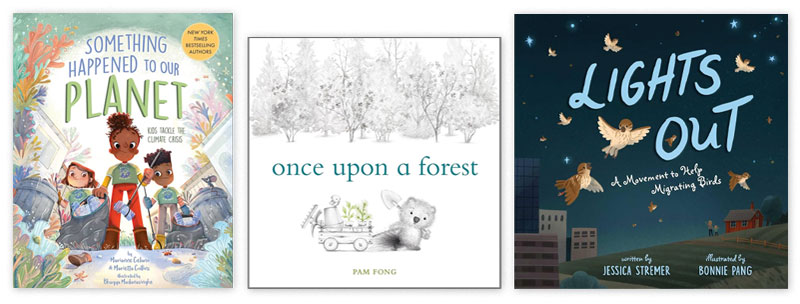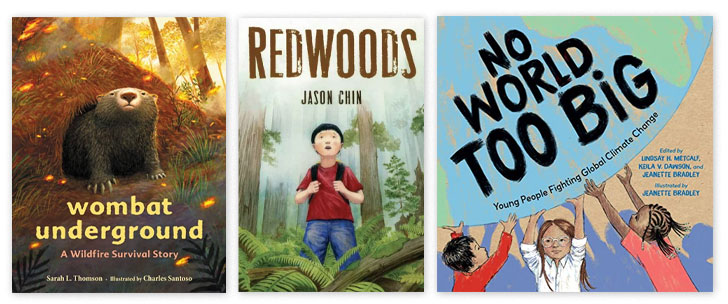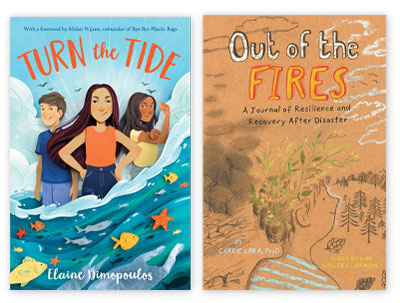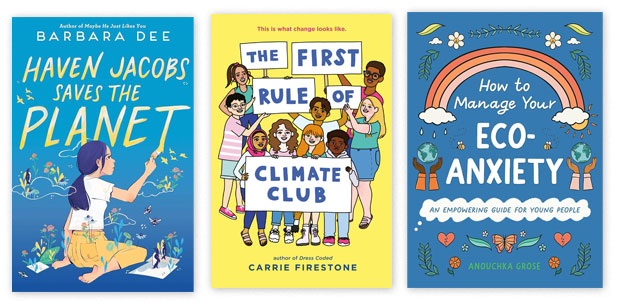A Climate Change Reading List to Inspire Action, Not Dread
These books help support positive discussions with students about the climate crisis.
Related Article |
In a recent Scientific American article, scientists who are also parents were asked how they talk to their children about climate change; they emphasized hope and the ability of people and nature to thrive alongside one another. Their positive approach to a difficult topic can be followed by school librarians who want to support climate change education in ways that highlight mental health for children.
In 2017, the American Psychological Association (APA) released a report on the mental health impacts of climate change for children. The organization presented key concepts for promoting mental wellness in the face of global climate challenges, including resilience, optimism, and social connections. These concepts can also be great key words for librarians to use with students and while seeking resources to counter the doom-scrolling that youth may have experienced while looking for internet information on climate change and related events.
“Climate resilience,”“climate optimism,” and “climate mental health” are keywords that lead the way to important resources to support children, families, educators, and communities in sharing information about coping with climate change. The following book list is designed as another resource for educators that introduces these central approaches to support positive discussions with students about the climate crisis.

Something Happened to Our Planet: Kids Tackle the Climate Crisis by Marianne Celano and Marietta Collins. illus by Bhagya Madanasinghe. Magination Press. Mar. 2023.
PreS–Gr 3–Published by an imprint of the APA, the book is a first-person narrative from a child’s perspective. Empowering individual action, emotional resilience, and persistence are modeled as children encounter distressing climate change information. Extensive teacher guides and resource lists accompanying the book are available on the APA web site.
Once Upon a Forest by Pam Fong. Random House Studio. Feb. 2022.
PreS–Gr 3–This wordless book follows a charming woodchuck in its effort to replant trees in a forest following a fire. The story promotes discussions about resilience in nature and the contributions of individuals who want to help care for the environment.
Lights Out: A Movement to Help Migrating Birds by Jessica Stremer. illus. by Bonnie Pang. S. & S./Paula Wiseman. Mar. 2024.
PreS–Gr 3–Spare text and eye-catching illustrations invite children to exercise environmental stewardship by reducing light pollution. A significant problem is simplified to the interaction between a sparrow that loses its way and a young girl who intercedes, with positive results.

Wombat Underground: A Wildfire Survival Story by Sarah L. Thomson. illus. by Charles Santoso. Little, Brown. Jan. 2022.
PreS–Gr 3–Wombats are the heroes in this picture book as they allow other wildlife to occupy their burrows to escape the devastating Australian wildfires of 2020. Teachers and caregivers will welcome the opportunity to share this amazing example of how the natural world can cope with dangerous climate events.
Redwoods by Jason Chin. Flash Point. March 2009.
Gr 1–4–Dust off this beautiful picture book that follows a boy on the subway reading about redwood trees to a redwood forest where he climbs into the canopy to learn about these amazing trees. Recent observations on the resilience of redwoods to drought and fire events, and new data at Redwoods Rising on their accelerated growth and carbon capture, make this well-known book an important addition to conversations about how the natural world adapts to climate change.
No World Too Big: Young People Fighting Global Climate Change by Lindsay H. Metcalf, Jeanette Bradley, and Keila V. Dawson. illus by Jeanette Bradley. Charlesbridge. Mar. 2023.
K–Gr 4–This colorfully illustrated book features young climate activists from around the world. Two-page spreads with simple explanations make the information accessible to young readers with an emphasis on local action that connect kids to climate change issues relevant to diverse communities.

Turn the Tide by Elaine Dimopoulos. Clarion. Mar. 2022.
Gr 3–7–A young climate activist faces obstacles in a campaign to ban plastic bags from her rural island community. Family involvement and personal connections illustrate the importance of social support in helping kids develop resilience while making a positive impact in their communities.
Out of the Fires: A Journal of Resilience and Recovery After Disaster by Carrie Lara. Illus. by Colleen Larmour. Magination Press Jul 2023.
Gr 3–8–This first-person fictional narrative is presented in the form of a journal written by a young person who experiences a wildfire climate event. Emphasizing multiple ways of coping, communicating, and recovering, this book could be a useful tool for teachers or families guiding conversations about resilience and climate mental health.

Haven Jacobs Saves the Planet by Barbara Dee. Aladdin. Aug. 2023.
Gr 4–8–Eco-anxiety is a key theme in this story which takes readers along as a young teen deals with unhealthy climate change worries while facing the challenges of middle school. Local activism, family discussions, professional therapy, and community support help her combat her fears as she leads the cleanup of a polluted river.
The First Rule of Climate Club by Carrie Firestone. Putnam. Jul. 2023.
Gr 5–6–Eighth graders tackle the climate crisis through a variety of environmental projects that will resonate with middle grade readers. Diverse characters with unique personalities keep the narrative fast-paced, often funny, and always interesting as their activist passions are shared through podcasts, notes, flyers and letters. Shared climate anxiety, positive family relationships, friendships and fears are all presented with a spirit of resilience and optimism.
How to Manage Your Eco-Anxiety: An Empowering Guide for Young People (10 Steps to Change) by Anouchka Grose. illus by Lauriane Bohémier. Magic Cat. Mar. 2024.
Gr 7–11–This cute notebook-style paperback gives teens the tools to step into the arena of climate activism while acknowledging and caring for their mental health.
Tiffany Coulson earned her MLIS from the University of Washington. She works as a public librarian and is also a curriculum designer and grant writer for an educational non-profit. Her professional interests include feminist research, mental health advocacy, family literacy and culturally relevant approaches to curriculum design. She peer-reviews research for several professional organizations as well as having reviewed grants on mental health in schools for the U.S. Department of Education.
RELATED
The job outlook in 2030: Librarians will be in demand
The job outlook in 2030: Librarians will be in demand
ALREADY A SUBSCRIBER? LOG IN
We are currently offering this content for free. Sign up now to activate your personal profile, where you can save articles for future viewing






Add Comment :-
Be the first reader to comment.
Comment Policy:
Comment should not be empty !!!